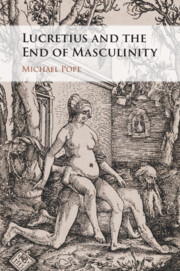Book contents
- Lucretius and the End of Masculinity
- Lucretius and the End of Masculinity
- Copyright page
- Contents
- Acknowledgments
- Abbreviations
- Chapter 1 Odd Men Out
- Chapter 2 Humbled Beginnings
- Chapter 3 Nature’s Assault upon the Senses
- Chapter 4 Death: The Hole That Gapes for All
- Chapter 5 The Ties That Bind
- Chapter 6 Vir Recreandus
- Bibliography
- Index
- Subject Index
Chapter 1 - Odd Men Out
Published online by Cambridge University Press: 11 May 2023
- Lucretius and the End of Masculinity
- Lucretius and the End of Masculinity
- Copyright page
- Contents
- Acknowledgments
- Abbreviations
- Chapter 1 Odd Men Out
- Chapter 2 Humbled Beginnings
- Chapter 3 Nature’s Assault upon the Senses
- Chapter 4 Death: The Hole That Gapes for All
- Chapter 5 The Ties That Bind
- Chapter 6 Vir Recreandus
- Bibliography
- Index
- Subject Index
Summary
This chapter serves as an introduction to the polemical dismissal of Epicurean teachings as sub-masculine and morally suspect. Epicureans are shown to figured as sexually receptive and effeminate by their ideological opponents. I argue that Lucretius accepts these criticisms and turns them around to show that Roman men are equally effeminate and penetrable. Objective, empirical observation of nature and physics proves that everyone, regardless of biological sex and sociological gender, is rendered penetrable and vulnerable by the constant issue and reception of atoms.
- Type
- Chapter
- Information
- Lucretius and the End of Masculinity , pp. 1 - 34Publisher: Cambridge University PressPrint publication year: 2023

